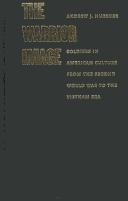| Listing 1 - 4 of 4 |
Sort by
|

ISBN: 0807868213 1469602482 9780807868218 9781469602486 9780807831441 0807831441 9780807858387 0807858382 Year: 2008 Publisher: Chapel Hill University of North Carolina Press
Abstract | Keywords | Export | Availability | Bookmark
 Loading...
Loading...Choose an application
- Reference Manager
- EndNote
- RefWorks (Direct export to RefWorks)
Images of war saturated American culture between the 1940's and the 1970's, as U.S. troops marched off to battle in World War II, the Korean War, and the Vietnam War. Exploring representations of servicemen in the popular press, government propaganda, museum exhibits, literature, film, and television, Andrew Huebner traces the evolution of a storied American icon--the combat soldier.
Soldiers --- Soldiers in art. --- Soldiers in literature. --- Soldiers in motion pictures. --- Popular culture --- History --- United States --- History, Military --- Civilization
Book
ISBN: 9780190853921 0190853921 Year: 2018 Publisher: New York, NY Oxford University Press
Abstract | Keywords | Export | Availability | Bookmark
 Loading...
Loading...Choose an application
- Reference Manager
- EndNote
- RefWorks (Direct export to RefWorks)
Americans today harbor no strong or consistent collective memory of the First World War. Ask why the country fought or what they accomplished, and "democracy" is the most likely if vague response. The circulation of confusing or lofty rationales for intervention began as soon as President Woodrow Wilson secured a war declaration in April 1917. Yet amid those shifting justifications, Love and Death in the Great War argues, was a more durable and resonant one: Americans would fight for home and family. Officials in the military and government, grasping this crucial reality, invested the war with personal meaning, as did popular culture. "Make your mother proud of you/And the Old Red White and Blue" went George Cohan's famous tune 'Over There." Federal officials and their allies in public culture, in short, told the war story as a love story. Intervention came at a moment when arbiters of tradition regarded the home and family as under pressure from all sides: industrial work, women's employment, immigration, urban vice, woman suffrage, and the imagined threat of black sexual aggression. Alleged German crimes in France and Belgium seemed to further imperil women and children. War promised to restore convention, stabilize gender roles, and sharpen male character. Love and Death in the Great War tracks such ideas of redemptive war across public and private spaces, policy and implementation, home and front, popular culture and personal correspondence. In beautifully rendered prose, Andrew J. Huebner merges untold stories of ordinary men and women with a history of wartime culture. Studying the radiating impact of war alongside the management of public opinion, he recovers the conflict's emotional dimensions--its everyday rhythms, heartbreaking losses, soaring possibilities, and broken promises. -- Inside jacket flaps.
World War, 1914-1918 --- Soldiers --- Social aspects --- Huston, George Waring, --- Dees, Eliga, --- Huebner, Arthur, --- World War (1914-1918)

ISBN: 9780807831441 9780807858387 Year: 2008 Publisher: Chapel Hill University of North Carolina Press
Abstract | Keywords | Export | Availability | Bookmark
 Loading...
Loading...Choose an application
- Reference Manager
- EndNote
- RefWorks (Direct export to RefWorks)
Popular culture --- Soldiers in art --- Soldiers in literature --- Soldiers in motion pictures --- Soldiers --- History --- United States --- Civilization --- History, Military
Book
ISBN: 0817320725 Year: 2020 Publisher: Tuscaloosa, Alabama : The University of Alabama Press,
Abstract | Keywords | Export | Availability | Bookmark
 Loading...
Loading...Choose an application
- Reference Manager
- EndNote
- RefWorks (Direct export to RefWorks)
"Scholars considered these questions during 'Dixie's Great War,' a symposium held at the University of Alabama in October 2017 to commemorate the centenary of the American intervention in the war. With the explicit intent of exploring iterations of the Great War as experienced in the American South and by its people, organizers John M. Giggie and Andrew J. Huebner also sought to use historical discourse as a form of civic engagement designed to facilitate a community conversation about the meanings of the war. Giggie and Huebner structured the panels thematically around military, social, and political approaches to the war to encourage discussion and exchanges between panelists and the public alike. Drawn from transcriptions of the day's discussions and lightly edited to preserve the conversational tone and mix of professional and public voices, Dixie's Great War: World War I and the American South captures the process of historians at work with the public, pushing and probing general understandings of the past, uncovering and reflecting on the deeper truths and lessons of the Great War--this time, through the lens of the South. This volume also includes an introduction featuring a survey of recent literature dealing with regional aspects of WWI and a discussion of the centenary commemorations of the war. An afterword by noted historian Jay Winter places 'Dixie's Great War'--the symposium and this book--within the larger framework of commemoration, emphasizing the vital role such forums perform in creating space and opportunity for scholars and the public alike to assess and understand the shifting ground between cultural memory and the historical record"--
| Listing 1 - 4 of 4 |
Sort by
|

 Search
Search Feedback
Feedback About UniCat
About UniCat  Help
Help News
News